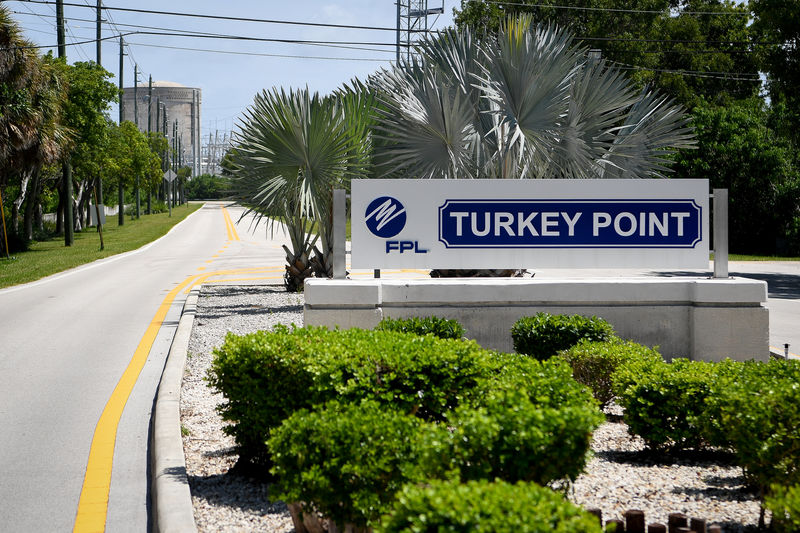By Scott DiSavino and Timothy Gardner
(Reuters) - Hurricane Irma will pose the toughest test yet for U.S. nuclear power plants since reactors strengthened their defenses against natural disasters following the Fukushima Daiichi nuclear accident in Japan in 2011.
Irma was on course to hit South Florida early on Sunday after slamming Cuba as a Category 5 storm. It weakened to a Category 3 storm with maximum sustained winds of 130 miles per hour (210 km per hour) on Saturday, but was expected to strengthen before reaching Florida, bringing a storm surge to a state home to four coastal nuclear reactors.
The National Hurricane Center's forecast track shows Irma making landfall on the southwest side of the Florida Peninsula, west of the two nuclear reactors at the Turkey Point plant.
The operator, Florida Power & Light (FPL), has said it will shut Turkey Point well before hurricane-strength winds reach the plant. The reactors are about 30 miles (42 kilometers) south of Miami.
FPL said it will also shut the other nuclear plant in Florida at St Lucie, which also has two reactors on a barrier island on the state's east coast, about 120 miles (193 km) north of Miami.
"We will shut the reactors down 24 hours before Category 1 force winds are forecast to hit," FPL Chief Executive Eric Silagy told a news conference.
FPL said both Turkey Point and St Lucie were designed to withstand storms stronger than any ever recorded in the region and both plants are elevated 20 feet (6 meters) above sea level to protect against flooding and extreme storm surges.
But South Miami Mayor Philip Stoddard said he was concerned about the potential for floods to damage power generators at Turkey Point, which in turn might threaten the ability of the plant to keep spent nuclear fuel rods cool. At Fukushima in Japan, an earthquake and tsunami disrupted power supplies and caused the fuel in some units to meltdown.
"The whole site is pretty well able to handle dangerous wind, the real problem from my perspective is water," Stoddard said. He said he was more worried about the nuclear waste than the reactors.
"The real question is can they keep the spent fuel cool."
Peter Robbins, an FPL spokesman, said “Mayor Stoddard is wrong. Turkey Point is safe and is ready for Hurricane Irma.”
U.S. nuclear operators have taken steps to improve preparations for disasters since Fukushima. The U.S. Nuclear Regulatory Commission (NRC) required plants to install portable pumps and generators to keep water moving over fuel rods and the spent fuel pool even if offsite power supply was lost.
Nuclear plants also hired more staff and stored equipment needed to deal with reactor problems.
"Things are better today than in March 2011. Time will tell whether better proves good enough," said Dave Lochbaum, director of a watchdog group, the nuclear safety project, at the Union of Concerned Scientists.
The NRC said it was posting more inspectors at the two Florida plants and was considering sending more inspectors to plants in Georgia and South Carolina should the storm head that way.
The NRC said the plants should not be compromised by Irma's storm surge.
"The storm surge forecasts that we have seen so far do not challenge the sites' designs," said NRC spokesman Scott Burnell.
Both Florida plants have previously weathered major storms. Turkey Point took a hit from Hurricane Andrew, a Category 5 storm, in 1992, damaging a smokestack at fossil fuel plant at the site. Repairs cost about $90 million.
St Lucie withstood the back-to-back impact of Hurricanes Frances (Category 2) and Jeanne (Category 3) in 2004.
FPL shut St Lucie last October as Hurricane Matthew skirted the Florida coast.
Lochbaum said the NRC and the industry could do more to reduce vulnerability to flooding.
In January 2014, about 50,000 gallons of rainwater leaked into the St Lucie plant after a heavy downpour. An NRC study blamed degraded and missing flood seals that were not discovered during checks after Fukushima.
There is also spent nuclear fuel at the site of a third power plant in Florida which stopped operating in 2009. That is the Crystal River plant, owned by Duke Energy Corp (N:DUK).
Duke is in the process of transferring used fuel from the spent fuel pool at the plant to dry cask storage as part of work to decommission the plant. Once in storage, the fuel no longer needs cooling.
The NRC's Burnell said Duke has suspended work to transfer the rods ahead of Irma. He said the fuel was safe and the plant also has backup power, even though it has been shut for years.
Irma is expected to disrupt much of Florida's power supply. FPL, the state's largest electric company, has warned Irma could cut service to about 4.1 million of its nearly 5 million customers. FPL is one of four large publicly traded utilities in Florida.
Other natural disasters since Fukushima have shut some plants. An earthquake in Virginia in 2011 shut Dominion Energy Inc's (N:D) North Anna plant for about 2-1/2 months, the time it took to complete a full damage inspection. That plant sustained no major damage.

Hurricane Sandy in 2012 caused three reactors in the U.S. Northeast to shut but inflicted no serious damage.